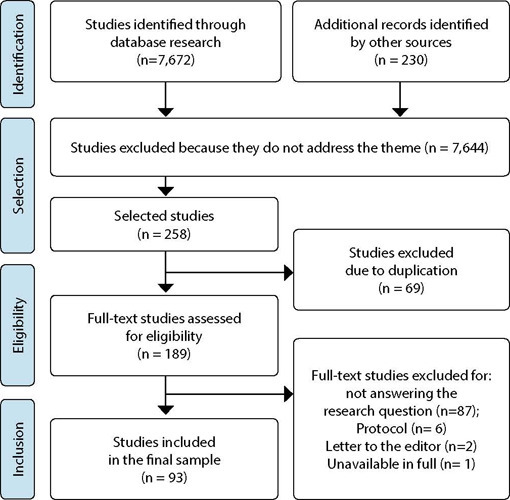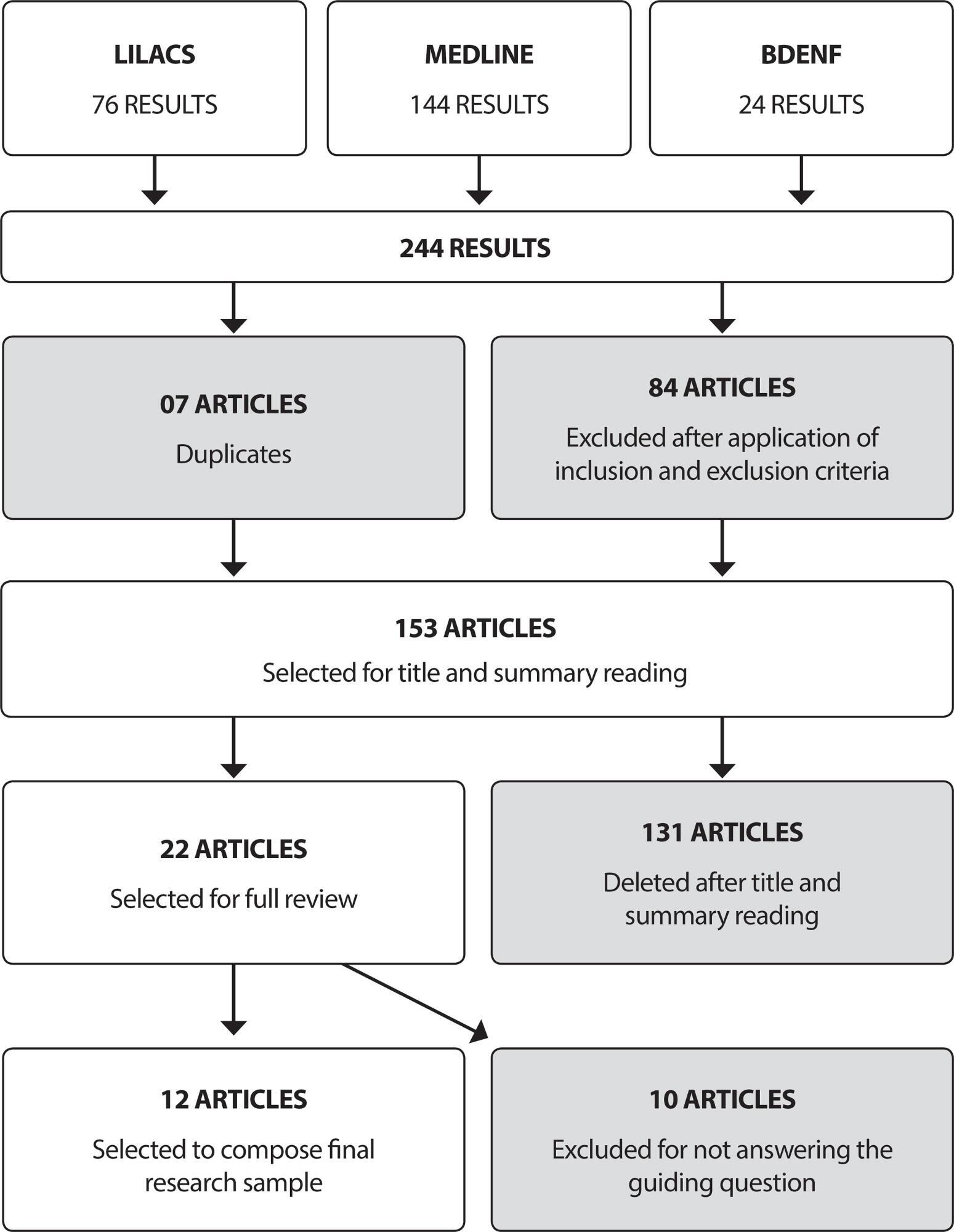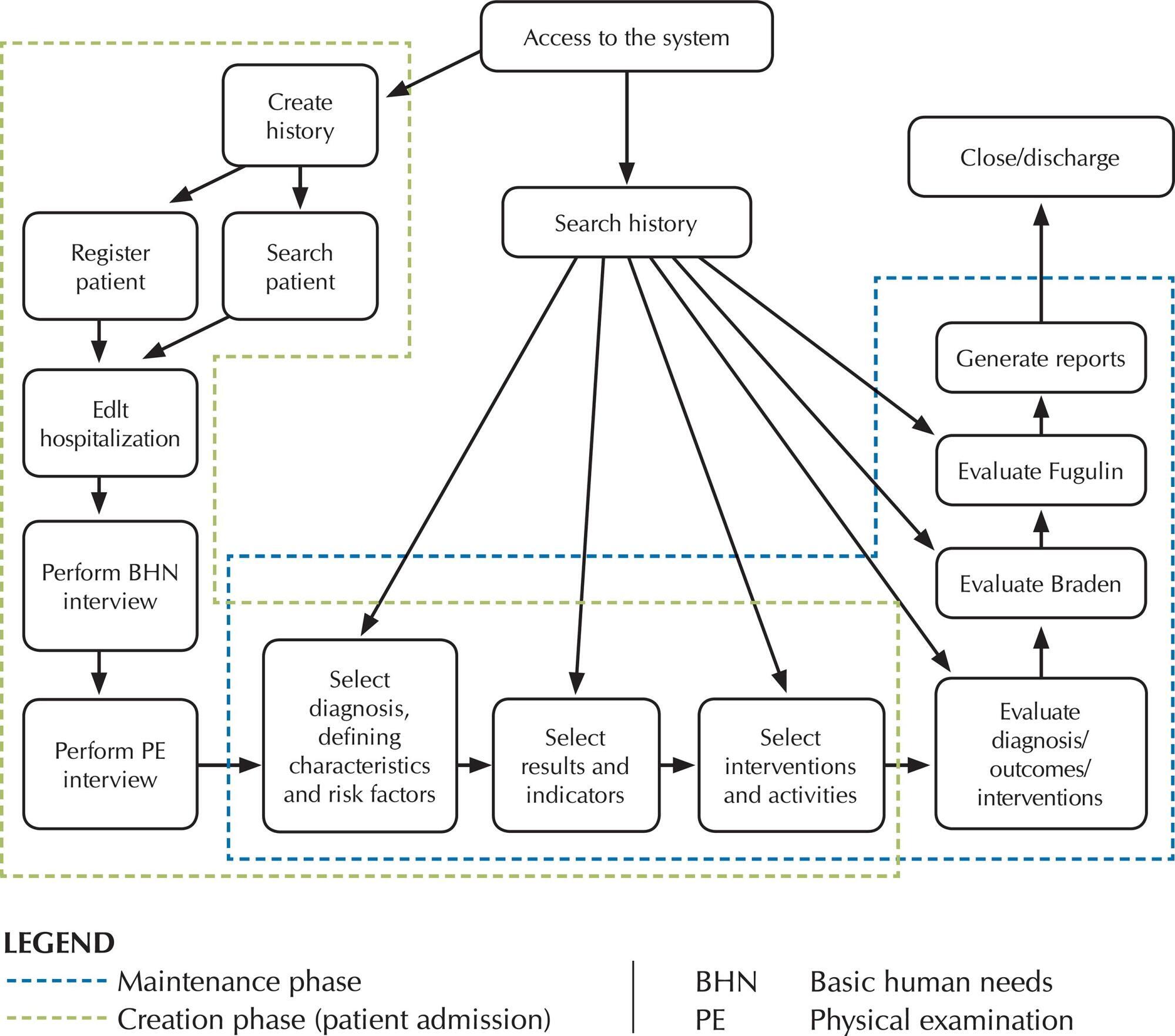-
ORIGINAL ARTICLE
Clinical simulation scenarios for the planning and management of infusion therapy by nurses
Revista Brasileira de Enfermagem. 2023;76(6):e20230019
12-04-2023
Resumo
ORIGINAL ARTICLEClinical simulation scenarios for the planning and management of infusion therapy by nurses
Revista Brasileira de Enfermagem. 2023;76(6):e20230019
12-04-2023DOI 10.1590/0034-7167-2023-0019
Visualizações0ABSTRACT
Objective:
to build, evaluate and test two clinical simulation scenarios for the planning and management of infusion therapy by nurses.
Methods:
methodological study, with construction of scenarios based on the NLN Jeffries Simulation Theory and the theoretical model Vessel Health Preservation; evaluation of the scenario design by judges, with calculation of the Modified Kappa Coefficient (MKC); testing scenarios with the target audience. Results: scenarios built for: 1. Patient assessment and vascular device selection; and 2. Identification and management of deep vein thrombosis. In the evaluation by judges, testing of validated scenarios in relation to educational practices and simulation design, the items evaluated presented MKC values ≥ 0.74.
Conclusion:
two evidence-based scenarios related to infusion therapy were constructed, with high levels of agreement among judges regarding their design. In testing with nurses, good results were obtained regarding the design and structuring of educational practice.
Palavras-chave: Educational MeasurementNursing EducationPatient Care PlanningSimulation TrainingVascular Access DevicesVer mais -
REVIEW
Elements for assistance to patients with hematological malignancies to propose care lines: a scoping review
Revista Brasileira de Enfermagem. 2023;76(2):e20220152
02-06-2023
Resumo
REVIEWElements for assistance to patients with hematological malignancies to propose care lines: a scoping review
Revista Brasileira de Enfermagem. 2023;76(2):e20220152
02-06-2023DOI 10.1590/0034-7167-2022-0152
Visualizações0ABSTRACT
Objectives:
to identify the elements for assistance to patients with hematological malignancies to propose a care line.
Methods:
this is a scoping review, anchored in the JBI theoretical framework, with searches carried out in April 2021, in eight electronic databases and 10 repositories of theses and dissertations.
Results:
the final sample consisted of 93 studies, and the main forms of assistance provided that can support a care line for this public were imaging tests, immunophenotyping, chemotherapy regimens, radiotherapy, infection management, assessment of nutritional status, maintenance of oral function, symptom management and screening for second malignancies.
Conclusions:
the elaboration of a care line for onco-hematologic patients is necessary, considering the complexity surrounding the diagnosis and treatment of hematologic malignancies, in addition to the difficulties that are imposed in relation to access and continuity of care in the network.
Palavras-chave: Comprehensive Health CareHematologic NeoplasmsNeoplasmsPatient Care PlanningPatientsVer mais
-
REVIEW
Nursing care for patients in post-transplantation of hematopoietic stem cells: an integrative review
Revista Brasileira de Enfermagem. 2021;74(3):e20200097
07-09-2021
Resumo
REVIEWNursing care for patients in post-transplantation of hematopoietic stem cells: an integrative review
Revista Brasileira de Enfermagem. 2021;74(3):e20200097
07-09-2021DOI 10.1590/0034-7167-2020-0097
Visualizações0ABSTRACT
Objectives:
to analyze the available evidence on the nursing care provided to patients after hematopoietic stem cell transplantation.
Methods:
integrative review with the search for primary studies in four databases and a virtual health library. A broad search strategy was used, including research published in English, Brazilian Portuguese, or Spanish, between 2008 and 2018, totaling a sample of 42 studies.
Results:
the studies were grouped into three categories: multiple nursing care (n=19), first-line care (n=18), and self-management of care (n=5).
Conclusions:
nursing care is critical, comprising patients’ physical, psychological and social aspects. It occurs in hospital and home contexts, mainly involving technical actions and health guidance. The evidence identified provide subsidies for decision-making; however, most studies are of the non-experimental type, indicating the need for conducting intervention research.
Palavras-chave: Bone Marrow TransplantationHematopoietic Stem Cell TransplantationNursing CarePatient Care PlanningProfessional PracticeVer mais
-
REVIEW
Nursing assistance in patient care with external ventricular drain: a scoping review
Revista Brasileira de Enfermagem. 2021;74(2):e20190796
04-16-2021
Resumo
REVIEWNursing assistance in patient care with external ventricular drain: a scoping review
Revista Brasileira de Enfermagem. 2021;74(2):e20190796
04-16-2021DOI 10.1590/0034-7167-2019-0796
Visualizações0Ver maisABSTRACT
Objectives:
to map the available evidence about nursing care aimed at adult patients using external ventricular drain.
Methods:
this is a review using the scoping review method.
Results:
Initially, 965 studies were identified and, after the eligibility criteria, a sample of 54 publications was obtained. Each of them was assessed according to GRADE, resulting in three studies with high quality; 14 with moderate quality; 32 with low quality; and five with very low quality. It was highlighted 20 nursing care subdivided into nine categories, namely: drainage system; bed positioning and mobilization; catheter care; monitoring of intracranial pressure; and medication administration.
Conclusions:
the scoping review made it possible to identify the main nursing care directed to adult patients undergoing placement of external ventricular drain from the evidence available to date.

-
EXPERIENCE REPORT
Coronavirus infections: health care planning based on Orem’s Nursing Theory
Revista Brasileira de Enfermagem. 2021;74(suppl 1):e20200281
02-15-2021
Resumo
EXPERIENCE REPORTCoronavirus infections: health care planning based on Orem’s Nursing Theory
Revista Brasileira de Enfermagem. 2021;74(suppl 1):e20200281
02-15-2021DOI 10.1590/0034-7167-2020-0281
Visualizações0ABSTRACT
Objective:
to report the experience of professors and students of a graduate course on nursing care in coping with the new coronavirus (COVID-19) based on Self-Care Theory.
Method:
the active methodologies used were a literature search and seminar presentations, with an understanding of Orem's theoretical concepts: health; man; self-care; universal, developmental and health deviation requirements; self-care activities; self-care deficits; the required therapeutic demand; nursing systems. The pandemic was considered a health deviation that requires critical thinking and nursing care planning. Methodological frameworks to classify nursing diagnoses, interventions, and outcomes were used.
Results:
for each health deviation, nursing systems were identified; self-care deficits, diagnoses; actions, interventions; and the form of assessment, outcomes.
Final considerations:
theoretical-practical reflections of the academic context support nursing care planning.
Palavras-chave: Coronavirus InfectionsNursing DiagnosisNursing ProcessNursing TheoryPatient Care PlanningVer mais -
REVIEW
Singular therapeutic project in mental health: an integrative review
Revista Brasileira de Enfermagem. 2020;73(2):e20180508
03-09-2020
Resumo
REVIEWSingular therapeutic project in mental health: an integrative review
Revista Brasileira de Enfermagem. 2020;73(2):e20180508
03-09-2020DOI 10.1590/0034-7167-2018-0508
Visualizações0ABSTRACT
Objectives:
to analyze the Singular Therapeutic Projects’ characteristics in mental health care used to assist the subject with psychological distress.
Methods:
it is an Integrative Literature Review study conducted in July 2017. The following databases used to collect the data were LILACS, MEDLINE and BDENF. After applying the inclusion and exclusion criteria, 12 articles were selected.
Results:
there was divergence between what was recommended by the Ministry of Health for PTS elaboration with that described in the studies analyzed. Emphasis is placed on the low participation and co-responsibility between team/user in PTS elaboration, excessive referrals to specialized mental health services, fragmentation of knowledge within the multidisciplinary team, and difficulty sharing and discussing information about cases.
Final considerations:
it is pointed out the need to adapt PTS elaboration, and its respective steps, to the needs of each individual.
Palavras-chave: Integrality in HealthMental HealthMental Health ServicesPatient Care PlanningPrimary Health CareVer mais
-
REVISÃO
Drug-Related Problems in the transitional care of the elderly from hospital to home
Revista Brasileira de Enfermagem. 2019;72(suppl 2):345-353
12-05-2019
Resumo
REVISÃODrug-Related Problems in the transitional care of the elderly from hospital to home
Revista Brasileira de Enfermagem. 2019;72(suppl 2):345-353
12-05-2019DOI 10.1590/0034-7167-2018-0848
Visualizações0ABSTRACT
Objective:
To identify the knowledge produced on Medication-Related Problems in the transitional care of the elderly from hospital to home.
Method:
Integrative review of the literature data, organized in six stages: guiding question; establishment of inclusion and exclusion criteria; extraction of data; analyze; interpretation of results; and presentation of the review. Articles were considered among 2002 and 2017, in Portuguese, English, and Spanish, in the databases LILACS, MEDLINE, CINAHL and EMBASE.
Results:
10 studies were selected and analyzed. They were categorized by subject and identified in three themes: Medication Discrepancy and Reconciliation (40%); Adhesion to Medication (30%); and Adverse Drug Events (30%).
Final considerations:
Drug-Related Problems in the transitional care of the elderly from hospital to home, were presented as a relevant theme for nursing, involving complex issues related to care. Drug reconciliation was evidenced as a coherent and effective strategy in home care transitions for the elderly.
Palavras-chave: Health of the ElderlyMedication Therapy ManagementNursing CarePatient Care PlanningTransitional CareVer mais
-
RESEARCH
Software for systematization of nursing care in medical units
Revista Brasileira de Enfermagem. 2018;71(5):2425-2431
01-01-2018
Resumo
RESEARCHSoftware for systematization of nursing care in medical units
Revista Brasileira de Enfermagem. 2018;71(5):2425-2431
01-01-2018DOI 10.1590/0034-7167-2016-0386
Visualizações0Ver maisABSTRACT
Objective:
To describe the development of a software prototype to apply the nursing process in clinical units of a general hospital, and assess its usefulness.
Method:
Applied methodological research of technological production of a program based on prototyping software engineering developed in three stages: specification, development, and validation.
Results:
Produced under the name of INFOSAE, the system represents a set of stages (history, diagnosis, expected outcomes, and nursing intervention) providing guidance to nurses to direct and guarantee the necessary care to patients, also allowing an assessment of this care.
Conclusion:
The INFOSAE software prototype, an easy-to-use computerized technology, obtained a favorable assessment by the user nurses that participated in the whole development process, from the specification to the validation of the system.




